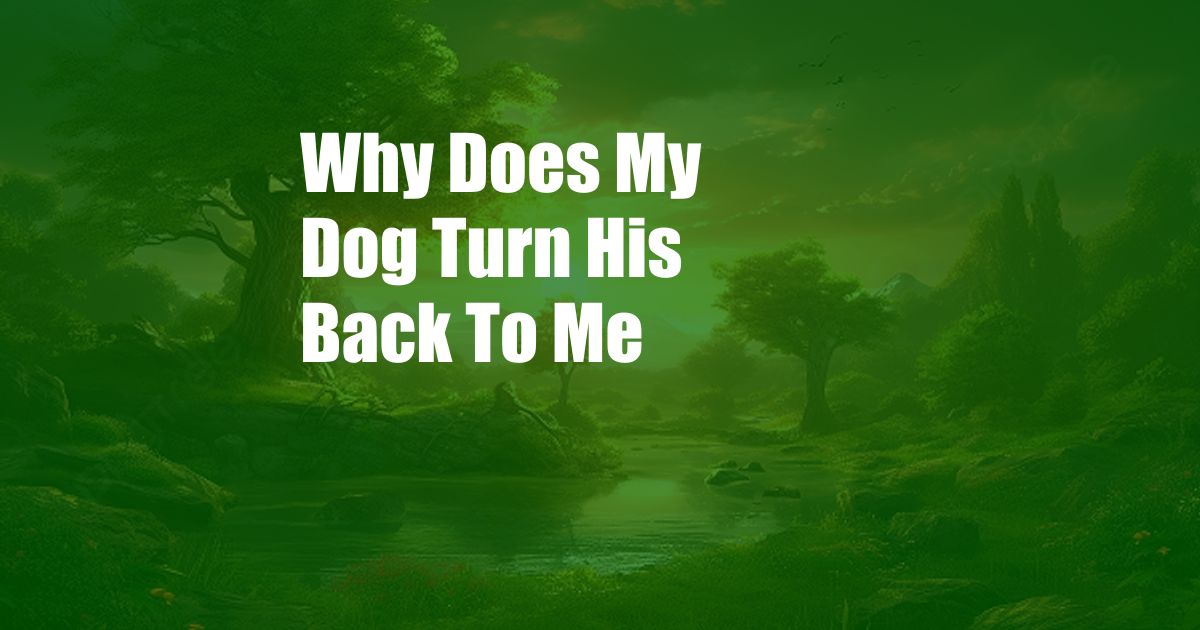
Why Does My Dog Turn His Back to Me?
A Mysterious Gesture or a Clear Message?
Have you ever wondered why your beloved canine companion sometimes turns its back to you? It’s a common behavior that can leave pet owners baffled and curious. While it may seem like a sign of disrespect or disinterest, understanding the reasons behind this behavior can help you strengthen the bond with your furry friend.
Body Language and Communication
In the world of dogs, body language plays a crucial role in communication. Dogs express their feelings and intentions through postures, gestures, and facial expressions. When a dog turns its back to you, it’s typically a non-aggressive way of expressing one of the following:
-
Submission or Deference: By turning its back, a dog may be acknowledging your dominance or indicating that it’s not a threat. This is a common gesture in hierarchical situations, such as when a submissive dog approaches a more dominant one.
-
Avoidance or Discomfort: If a dog is feeling anxious, uncomfortable, or threatened, it may turn its back as a way to avoid confrontation or give itself some space. This can occur in situations such as meeting strangers, encountering other dogs, or being in unfamiliar environments.
-
Protection: In rare cases, a dog may turn its back to you as a way of protecting itself or its territory. This defensive behavior is usually accompanied by other signs of aggression, such as growling, baring teeth, or lunging.
Understanding the Context
To fully understand why your dog is turning its back, it’s important to consider the context of the situation. Look for other cues in your dog’s body language, such as tail position, ear position, and facial expressions. Pay attention to your own actions and the environment around you.
-
Was your dog previously startled or frightened? A dog may turn its back as a way of calming itself down or creating distance from a perceived threat.
-
Is your dog in a stressful or unfamiliar situation? Anxiety can cause dogs to turn their backs as a coping mechanism.
-
Are you approaching your dog in a threatening manner? If your movements or tone of voice are perceived as aggressive, your dog may turn its back as a way of protecting itself.
Building a Stronger Bond
By understanding the reasons behind your dog’s behavior, you can take steps to build a stronger bond and address any underlying issues. Here are a few tips and expert advice:
-
Respect your dog’s space: Avoid overwhelming your dog with excessive affection or attention. Respect its boundaries and give it ample space when needed.
-
Create a calm and stress-free environment: Provide your dog with a safe and comfortable home where it feels secure. Minimize triggers that may cause anxiety or fear.
-
Use positive reinforcement: Encourage your dog’s desired behavior through treats, praise, and play. Avoid punishing or intimidating your dog, as this can damage the bond and reinforce negative behaviors.
-
Seek professional help if necessary: If your dog’s behavior is persistent or concerning, don’t hesitate to consult with a veterinarian or certified animal behaviorist. They can help you identify the root cause and develop a training plan to address the issue.
Conclusion
Understanding why your dog turns its back to you is essential for building a strong and harmonious relationship. By observing your dog’s body language, considering the context, and following these tips, you can gain a deeper insight into your furry friend’s behavior and create a positive and fulfilling environment for both of you.
Please share your thoughts and experiences on this topic. Do you have any questions or insights to contribute? Your feedback is highly appreciated!